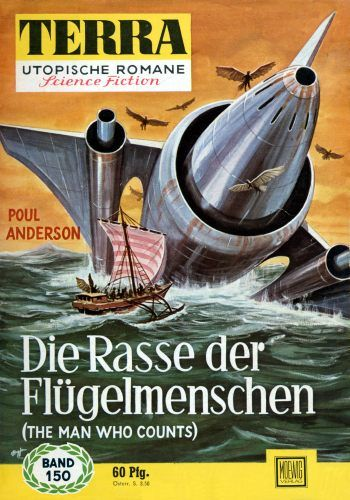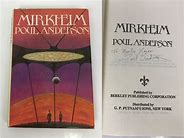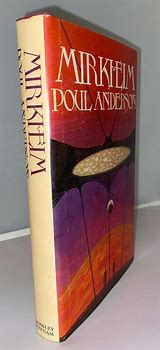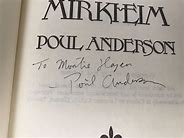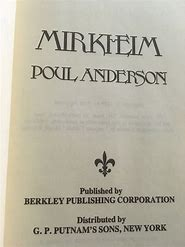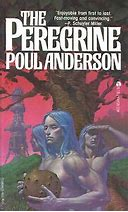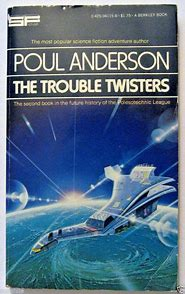Fair warning to the prurient minded, despite the title of my article, this essay is not pornographic, so get your minds out of the sewers!
Over a career in writing spanning more than half a century Poul Anderson used or touched on a vast range of topics. Here I want to note how sex might be used or abused in the future, using his Technic stories for some striking examples.
Two basic premises for Anderson's Technic series are (1) a FTL interstellar drive was invented; and (2) many non-human intelligent races were discovered. With these premises many, many possibilities becomes thinkable.
I absolutely expect humans in the future to continue using and abusing sex in all the ways we see that being done in the real world, here and now. I also expect sexual encounters between humans and non-humans to happen, especially if these species are not physically repellent to each other.
I should also stress that intelligent races which had independently evolved on different worlds over billions of years will not be mutually interfertile. And that will remain true no matter how much two such species resembles each other.
The text quoted below came from Chapter II of A CIRCUS OF HELLS, one of Anderson's stories about Dominic Flandry, Intelligence officer for an interstellar Terran Empire set more than 1000 years from now in the future.
Outside a particular joyhouse, otherwise undistinguished
from the rest, an Irumclavian used a vocalizer to chant
in Anglic: "Come one, come all, come in, no cover, no
minimum. Every type of amusement, pleasure, and thrill.
No game too exotic, no stakes too high or low. Continuous
sophisticated entertainment. Delicious food and drink,
stimulants, narcotics, hallucinogens, emphasizers, to your
order, to your taste, to your purse. Every sex and every
technique of seventeen, yes, seventeen intelligent species
ready to serve your desires, and this does not count racial,
mutational, and biosculpt variations. Come one, come all--"
A little later, in the same chapter, as Flandry left the "gravshaft" on the level where he was going to a "business" meeting with Leon Ammon, proprietor of this dubious establishment, we read: "He was glad when Door 666 admitted him; that was on the sado-maso level, and he had glimpsed things. Further on in Chapter II, "Flandry had his suspicions about the origin of many of the subjects on the floor below. Consenting adults . . . after brain channeling and surgical disguise..."
The extremely disreputable business establishment Flandry had entered was a brothel, set more than a thousand years in the future. The distaste he had for the sado-maso shows readers he was not "into" the really gross and perverted types of sex. Over and over, in the Flandry stories, readers will see he was a normal male heterosexual who liked and preferred women. And, in the right circumstances, xenosophont females!
It's right to quote again from A CIRCUS OF HELLS, to illustrate how kinky futuristic sex might be. The text quoted below came from the beginning paragraphs of Chapter III. A major character, a prostitute named Djana, went to meet what she thought would be a human customer but was not.
Bracing herself and wetting her lips, she said, "I don't. Not with xenos--"
and in haste, fearing offense might be taken, "I mean non-human sophonts.
It isn't right,"
"I suspect a large enough sum would change your mind," the other
said. "You have a reputation for avarice. However, I plan a different
kind of proposition. It moved slowly closer, a lumpy gray body on four
thin legs which brought the head at its middle about level with her
waist. One tentacle sent the single loose garment swirling about in
a sinuous gesture. Another clutched the vocalizer in boneless
fingers. The instrument was being used with considerable skill;
it actually achieved an ingratiating note. "You must know about
me in your turn. I am only Rax, harmless old Rax, the solitary
representative of my species on this world. I assure you my
reproductive pattern is sufficiently unlike yours that I find your
assumption comical."
I agree that, assuming a FTL interstellar community with thousands of intelligent races, some humans and xenosophonts will have sex. But others like Djana will believe that to be wrong or disgusting. Others, like that of Rax's species, will have reproductive patterns so different from those of other races that the idea of sex with them was merely laughable.
I wish to backtrack a bit to comment about Rax, in the text quoted from Chapter III. I noted how Rax was referred to as "it," instead of either "he" or "she." That made me wonder if Rax came from a race which did not have male or female sexes, reproducing in other ways.
The quotes taken from A CIRCUS OF HELLS gives Anderson's readers some fascinating if speculative glimpses into the sordid, seamy underside of what an interstellar civilization could be like. And these glimpses Anderson gave us can be easily paralleled in many similar brothels and prostitutes of both sexes in the real world. The more squalid aspects of the steamy night life of Las Vegas and Atlantic City, in the US, comes to mind as two examples!
To be strictly fair even to Leon Ammon not everything offered at his disreputable establishment will be morally repugnant, such as his restaurant services. Or even some gambling, in moderation and only if the games are honest.
In Chapter 4 of ENSIGN FLANDRY, we see Dragoika, a ship captain and a very influential member of the Sisterhood of Kursoviki. She belonged to a species, the Tigeries of Starkad, physically resembling humans so closely that Dragoika found Flandry attractive.
"Pity you must wear that helmet," Dragoika said. "I'd like to taste your lips.
But otherwise we're not made so differently, our two kinds. Will you come
to my cabin?"
For an instant that whirled, Flandry was tempted. He had everything he
could do answer. It wasn't based on past lectures about taking care not
to offend native mores, nor on principle, nor, most certainly, on fastid-
iousness. If anything, her otherness made her the more piquant. But
he couldn't really predict what she might do in a close relationship,
and--
"I'm deeply sorry," he said. "I'd love to, but I'm under a--" what was the
word?--"a geas."
She was neither much offended nor much surprised. She had seen a
lot of different cultures. "Pity," she said. "Well, you know where the
forecastle is. Goodnight." She padded aft. En route, she stopped to
collect Ferok.
--and besides, those fangs were awfully intimidating.
This amusing quote from ENSIGN FLANDRY shows Anderson speculating that parallel evolution would make humans and some non-humans physically resemble each other closely enough to be sexually attractive. I also noted mention of those lectures stressing the need to avoid offending Tigery mores. Flandry was wise to very tactfully decline Dragoika's proposition. A thousand years and more must have taught humans and non-humans alike many hard lessons on the need for caution in such intimate matters. It was also entertaining for Flandry to be intimidated by Dragoika's fangs!
I want to touch on one more example of futuristic sex between a human and non-human from the Technic stories. Years after both ENSIGN FLANDRY and A CIRCUS OF HELLS, Captain Flandry was kidnapped by unusually humanoid aliens in "Tiger by the Tail." This quote segues into how he was able to act as he did on Scotha: "The being was remarkably humanoid. Certain differences of detail could quite likely be found beneath the clothes, and more basic ones beneath the skin. Among countless worlds, evolutionary coincidences are bound to happen now and then, but never evolutionary identities. Yet to the eye, crew member and captive resembled each other more than either resembled, say, a woman. Or an alien female? Flandry wondered. I'll bet this is a male, and equipped pretty much like me, too. (AGENT OF THE TERRAN EMPIRE, revised Gregg Press edition, 1979, page 2). That last part, "equipped pretty much like me, too," was Anderson's way of alerting readers that Scothans and humans were sexually compatible.
After being taken by these xenosophonts to their home planet Flandry met the wife of their king, Queen Gunli. Because of soon becoming aware of her unhappiness, he was friendly and obliging to the queen, as part of his efforts to undermine Scotha. Another apt quote is this: "Flandry gave her an appreciative look. He had ascertained that Scothanian and human females were extremely similar in outward anatomy. Queen Gunli was a stunblast, with dark rippling hair, big violet eyes, daintily sculptured features, and a figure that a thin, clinging gown scarcely hid." (AGENT OF THE TERRAN EMPIRE, page 20). Meaning humans and Scothans could be attracted to each other.
Queen Gunli did not like the Frithians, the Scothan nation which conquered and unified the planet, or their plans for more aggression and war. The text copied below came from the revised version of the story in AGENT OF THE TERRAN EMPIRE (Gregg Press: 1979), page 30.
"War is what they want."
"But not what the females want. Not to wait and wait and wait for the ships
to come back, never knowing whether only his sword will return. Not to rock
a baby and know that a few years hence he will be a corpse on the shores
of some alien planet. Not to--" She broke off and straightened her slim
shoulders. "Let me not whimper. Naught can I do about it."
"You are very brave as well as beautiful, Gunli," said Flandry. "Your kind
have changed fate ere now." And he sang, low, a stave he had made in
the Scothan bardic form:
"So I see you standing,
sorrowful in darkness.
But the moonlight's broken
by your eyes, tear-shining--
moonlight in the maiden's
magic net of tresses.
Gods gave many gifts, but,
Gunli, yours was greatest."
All at once she was in his arms.
It was danger, loneliness, common ends they both desired, as well as mutual attraction that brought Flandry and Gunli into having an affair, despite being of alien races. Anderson had too much good taste to feel any need to be sexually explicit, that was left implicit. I also appreciated the verse he wrote here, it moderated the breakneck pacing of the story, giving readers a moment for reflecting on the issues that story raised.
Last, near the end of "Tiger by the Tail," on page 40 of the Gregg Press edition of AGENT OF THE TERRAN EMPIRE, we read this, as Flandry and Gunli waited for the Terrans to land on Scotha:
She brought her left hand from beneath the cloak and took both his.
"And what will you be doing?" she asked.
He met her gaze. Loneliness was sudden within him. How beautiful
she stood there.
But what she meant could never endure. They were too foreign to each
other. Best he depart soon, that the memories remain untarnished in
them both. She would find someone else at last. And he--well-- "I have
my work," he said.
I agree with Flandry's decision, because he and Queen Gunli belonged to different intelligent species. No matter how much two such races may look like each other, billions of years of separate evolution on different planets inevitably means both races will have fundamental differences from each other. And that's going to remain true even if males and females can have sexual intercourse. Also, the genetic barrier would make it impossible for them to have children. It was right of Flandry to decide it was better, for both Gunli and him, that he soon leave Scotha, parting from each other in friendship.
I consulted the second edition of THE ENCYCLOPEDIA OF SCIENCE FICTION (ed. John Clute and Peter Nicholls. St. Martin's Press, 1993) to get some idea of how other science fiction writers handled the theme of human/alien sex. Alas, all I found on page 1090, in Nicholls' article "SEX" I thought relevant to Anderson's work was this: "A sensitive treatment of love between alien races is STRANGERS (1974, NEW DIMENSIONS; exp 1978) by Gardner DOZOIS, which draws attention to the ghastly errors that can occur from trying to understand a foreign society in terms of the assumptions of one's own."
But, when I looked up John Clute's entry for Dozois, this is what I found on page 352 of the ENCYCLOPEDIA: "...his first solo novel, STRANGERS (1974, NEW DIMENSIONS; exp 1978), an intense and well told love story between a human male and a ALIEN female, set on her home planet, in a Galaxy humans signally do not dominate, her death from bearing his child is biologically inevitable (the plot's derivation from Philip Jose FARMER'S The Lovers [1961] can be seen as homage) and stems from a mutual incomprehension rooted in culture and the intrinsic solitude of beings (see also SEX)."
This exasperated me! I agree it might be possible some intelligent races, human and non-human, could so strongly resemble each other that sexual attraction and desire will be likely. I also agree it's highly probable mutual alienness will breed strains, stresses, problems, and tragedies. I do not agree, given totally alien genetics and separate evolution over billions of years on different planets, that humans and aliens will be able to have children. I was disappointed that Clute and Nicholls seemed unaware of that scientific absurdity. That absurdity also discredits any stories by other SF authors who write of humans and aliens being able to have children.
Before offering some general conclusions I'll quote from Chapter III of THE REBEL WORLDS to show how some non-humans might reproduce: "I know of intelligent hermaphrodites, and sophonts with more than two sexes, and a few that regularly change sex. They all tend to look on our reproductive pattern as obscene." I can too easily imagine beings from some of these species "working" as prostitutes in Leon Ammon's "joyhouse."
Being, as I am, both Catholic and a conservative, I would not be at all surprised to find out brothels and sexual perversions of all kinds will exist in the far future. I believe in having no illusions about how flawed humans and xenosophont races, if they exist, are likely to be if they too have fallen. Humans being what they are--and xenosophonts, as I suspect they will be--there will be sexual encounters between members of different species, but that will not always occur because of force and violence. I appreciated how Anderson drew out such implications without needing to be pornographic!
Appendix I: JIHANNATH
For the sake of completeness I am discussing here a few details which did not quite fit into the main body of this article. In Chapter V of A CIRCUS OF HELLS Djana said to Flandry: "I came up from slavery--in the Black Hole of Jihannath--what I've been through makes the worse they've thought of in Irumclaw Old Town look like a creche game--" And in Chapter XV Djana also said: "Where were the Emperor and his law when I tried to escape from the Black Hole, fifteen years old, and my contractor caught me and turned me over to the Giggling Man for a lesson?" As far as this goes, the point we need to keep in mind is to have no illusions about prostitution, far too many times "sex workers" did not enter that "profession" freely, but by force and are often kept obedient and in line by abuse and torture.
But, the complication here was that Jihannath was not part of the Empire when Djana was a child. A few years later, in Chapter II of THE REBEL WORLDS, as Vice Admiral Kheraskov was briefing Flandry we read: "I'm not letting out any great secret when I tell you the latest Merseian crisis is worse than the government admits to the citizens. It could completely explode on us. I think we can defuse it. For once, the Empire acted fast and decisively. But it demands we keep more than the bulk of our fleets out on that border, till the Merseians understand we mean business about not letting them take over Jihannath." And we know from THE DAY OF THEIR RETURN that the Roidhunate was forced to back down and let go of Jihannath.
What I quoted above made nonsense of Djana's complaint about the Emperor and his law, because that planet was not ruled by Terra in her childhood. It was a formerly independent border world of little interest to the Empire until Merseia tried to seize it. Terra most likely took such decisive counter measures because the location of Jihannath would make Merseian occupation of the planet a threat to the Empire. But a lengthy explanation of all this in the middle of my article would have been too disruptive!
Appendix II: L. SPRAGUE DE CAMP
The disappointment I felt when I tried to use the second edition of THE ENCYCLOPEDIA OF SCIENCE FICTION to find out how other science fiction writers used the idea of human/alien sex irritated me. So much so that my memory was joggled into recalling how L. Sprague de Camp had some very pertinent things to say about that topic in his novel THE HOSTAGE OF ZIR (Berkley/Putnam: 1977).
From THE HOSTAGE OF ZIR, Chapter Nine, page 119:
Reith was going to explain that hybridization of species from different
worlds, no matter how superficially alike, was a biological impossibility.
On second thought, he decided to say nothing for the present. If he
made a point of their mutual sterility, Shosti might find his presence an
embarrassment and have him pitched off the cliff. He finished lamely:
"Nought, madam. I did but hope that--ah--the key would fit the lock."
"Fear not, my lord. I have made trial of you Ertsuma before and find
them compatible...."
And from HOSTAGE, Chapter Ten, page 146, a non-human character asked if it was possible for males and females of their two species to have children: "Reith shook his head. "That were impossible, sir. Earthmen and Krishnans are as mutually sterile as-as an aya and a shomal. Professor Mulroy, among my tourists, could explain it; something to do with the tiny cells whence living things originate. The-the-our word is chromosomes-it fit not together."
If, in a book meant by de Camp to be humorous science fiction serious, even obvious points like these were made, the authors of the entries I quoted from THE ENCYCLOPEDIA OF SCIENCE FICTION should have done so as well!



